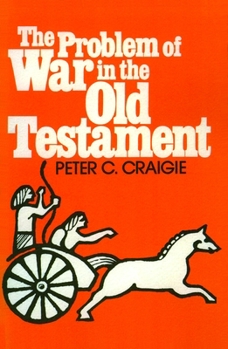The Problem of War in the Old Testament
Select Format
Select Condition 
Book Overview
This is a print on demand book and is therefore non- returnable. The predominance of war in the Old Testament troubles many Christians. However, it is an issue that must be faced, says Peter Craigie, because it has serious ramifications for contemporary Christian attitudes about war. Craigie categorizes the problems into two kinds -- personal and external. The personal problems arise from the Christian's attempt to grapple with...
Format:Paperback
Language:English
ISBN:0802817424
ISBN13:9780802817426
Release Date:January 1979
Publisher:William B. Eerdmans Publishing Company
Length:128 Pages
Weight:0.41 lbs.
Dimensions:0.3" x 5.5" x 8.5"
Customer Reviews
3 ratings
The most useful book I've read on the topic
Published by Thriftbooks.com User , 15 years ago
I have recently read a handful of books on biblical perspective of war in an attempt to gain a better understanding on the subject. Though I selected these handful of books basically at random, they all tackled the topic in a different way. Likewise, they all came to different conclusions. This book was the most relevant and useful. As it focuses only on the OT, it is not conclusive, but it does draw upon conclusions. And it attempts to explain how God could permit/approve the bans and other wars of aggression by the Israelites, and how these OT stories tie into the NT. Its a good starting point to understand a traditional viewpoint of God's use of war.
A Broad Perspective on a Tough Issue
Published by Thriftbooks.com User , 16 years ago
Peter Craigie confronts the reality of God's involvement in warfare, particularly as revealed in the Old Testament, in this brief book. He does not attempt to soften the blow of some of the harsher passages found in Scripture, but rather attempts to develop a theology of warfare that helps us understand the record of the Old Testament. Craigie identifies three problems created by the war material in the Old Testament, including; 1. The Problem of God: the theological problem of reconciling God as Warrior with a God of love. 2. The Problem of Revelation: understanding why all of this war material was recorded in Scripture. 3. The Problem of Ethics: reconciling the ethics of the Bible. Craigie argues that the primary affirmation concerning God found in the Old Testament is that, despite His transcendence, the living experience of the immanent God is to be found within the fabric of human history. God works through history, and thus He works through sinful humans. This entails that God's activity in the world must be associated with sinfulness. As the ultimate sovereign of human history, God will necessarily have some kind of relationship to war. The existence and survival of states in the ancient world, Craigie points out, depended upon military might. Even treaties for peace between nations required the presence of military might to reinforce the contract. Even if Israel chose to never engage in proactive war, the nation would inevitably face war initiated from neighboring states and enemies. Craigie challenges the so-called "Just War Theory," which was advocated by the Church Fathers Ambrose and Augustine and which finds many contemporary proponents. According to this theory, war must be governed according to certain rules. Craigie contends that, to the contrary, real war is not a game played by rules. If war is to be waged at all, it must be done thoroughly. Rather than romanticize warfare or gloss over the horrors, the Old Testament realistically pictures warfare as it really is- brutal, inhumane, and tragic. The Problem of God can start to be answered when we realize that God is a warrior because men wage wars. Since God works through men, He is intimately and inevitably involved in history. The Problem of Revelation can be addressed when we interpret the Old Testament as a whole- not just the conquest narratives, but also the defeat narratives. Craigie identifies two themes emerging from this broad material; 1.) man and the state are alike, and 2.) God's purpose for the redemption of all mankind was to be realized through the Kingdom. While the Old Kingdom of the OT was established by the use of violence, the New Kingdom ushered in by Jesus Christ is established by the receipt of violence, when God the Warrior became the Crucified God. When dealing with the Problem of Ethics, Craigie advocates a `dual-citizenship model. Christians are citizens of the Kingdom of God, where there is no violence, but they are also citizens of the
Find a Copy!
Published by Thriftbooks.com User , 22 years ago
This is a treasure. It helps one sort out one of the oft-quoted critiques of the OT: "It's violent, whereas the NT is love. There is all that war and God telling His people Israel to wage war and take actual, physical lives.Craigie aptly and ably shows the theme throughout the Scriptures of Yahweh Sabaoth, the Ultimate Warrior, and the carryover to the new.There are just outstanding conclusions here, e.g. "War is a large-scale manifestation of the nature of man." "God has participated in warfare towards the ends of both judgment and redemption."Gems to be gleaned from this work, some of which may also be found in his commentary on Deuteronomy.






